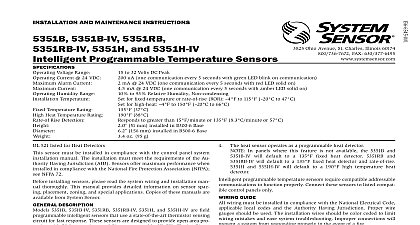System Sensor 2351TB and 2351TB-IV Intelligent Photoelectric and Temperature Sensors (Select Series)

File Preview
Click below to download for free
Click below to download for free
File Data
| Name | system-sensor-2351tb-and-2351tb-iv-intelligent-photoelectric-and-temperature-sensors-select-series-8457639210.pdf |
|---|---|
| Type | |
| Size | 899.79 KB |
| Downloads |
Text Preview
INSTALLATION AND MAINTENANCE INSTRUCTIONS and 2351TB IV Photoelectric and Temperature Sensors Voltage Range Current 24 VDC Alarm Current Current Humidity Range Temperature Range Velocity Load Rating refer to your isolator base module manual for isolator calculation instructions to 32 VDC uA one communication every 5 seconds with green LED blink on communication mA 24 VDC one communication every 5 seconds with red LED solid on mA 24 VDC one communication every 5 seconds with amber LED solid on to 93 Relative Humidity Non condensing to 115 0 to 47 to 4000 ft min 0 to 1219.2 m min 51 mm installed in B300 6 Base 156 mm installed in B300 6 Base 4.1 104 mm installed in B501 Base oz 95 g Ohio Avenue St Charles Illinois 60174 FAX 630 377 6495 268 listed for Open Air Protection 521 listed for Heat Detectors sensor must be installed in compliance with the control panel system manual The installation must meet the requirements of the Au Having Jurisdiction AHJ Sensors offer maximum performance when in compliance with the National Fire Protection Association NFPA NFPA 72 DESCRIPTION 2351TB and 2351TB IV are plug in type multi sensor smoke sensors combine a photoelectronic sensing chamber and 135 57.2 fixed heat detector across addressable analog communications The transmit an analog representation of smoke density over a communi line to a control panel Rotary dial switches are provided for setting the address See Figure 1 The intelligent photoelectric and temperature also transmit an alarm signal due to heat at 135 57.2 per UL 1 ROTARY ADDRESS SWITCHES 0 0 LEDs on the sensor are controlled by the panel to indicate sensor status output is provided for connection to an optional remote LED annunciator RA100Z Sensor panels offer different features sets across different models As result certain features of the photoelectric and temperature sensors may be on some control panels but not on others 2351TB and 2351TB IV Advanced Protocol and CLIP Classic Loop Interface Protocol mode possible features available if supported by the control panel are The sensor LEDs can operate in three ways off and blinking can be set to red green or amber This is controlled by the panel The remote output may be synchronized to the LED operation or con independent of the LEDs Devices are point addressable up to 159 addresses refer to the operation manual for the UL listed control panel for spe operation The photoelectric and temperature sensors require compatible communications to function properly Connect these sensors to control panels only Sensor recommends spacing sensors in compliance with NFPA 72 In air flow applications with smooth ceilings space sensors 30 feet apart m When using the photoelectric and temperature sensors as a heat de in FM3210 compliant applications space sensors 20 feet apart 6 m For information regarding sensor spacing placement and special appli refer to NFPA 72 or the System Smoke Detector Application Guide from System Sensor GUIDE wiring must be installed in compliance with the National Electrical Code local codes and any special requirements of the Authority Having Proper wire gauges should be used The installation wires should color coded to limit wiring mistakes and ease system troubleshooting Im connections will prevent a system from responding properly in the of a fire power from the communication line before installing sensors Wire the sensor base supplied separately per the wiring diagram Figure 2 Set the desired address on the sensor address switches see Figure 1 Install the sensor into the sensor base Push the sensor into the base while it clockwise to secure it in place After all sensors have been installed apply power to the control panel and the communication line Test the sensor s as described in the TESTING section of this manual covers provide limited protection against airborne dust particles during Dust covers must be removed before the sensors can sense smoke sensors prior to heavy remodeling or construction 2 WIRING DIAGRAM Do not loop wire under 1 or 2 Break wire run to connections A OPTIONAL WIRING C0129 10 and temperature sensors include a tamper resistant capability prevents their removal from the base without the use of a tool Refer to base manual for details on making use of this capability testing notify the proper authorities that the system is undergoing and will temporarily be out of service Disable the system to unwanted alarms sensors must be tested after installation and periodically thereafter Test methods must satisfy the Authority Having Jurisdiction AHJ Sensors maximum performance when tested and maintained in compliance with 72 sensor can be tested in the following ways Functional Magnet Test P N M02 04 01 or M02 09 00 Hold the test magnet in the magnet test area as shown in Figure 3 This sensor can be functionally tested with a test magnet The test magnet simulates smoke in the sensing chamber testing the sensor and connections to the control panel The sensor should alarm the panel Two LEDs on the sensor are controlled by the panel to indicate sensor Coded signals transmitted from the panel can cause the LEDs to latch on or latch off Refer to the control panel technical documen for sensor LED status operation and expected delay to alarm Smoke Entry Sensitivity readings are available through the FACP Refer to the manufac published instructions for proper use Additionally canned aerosol simulated smoke canned smoke agent may used for smoke entry testing of the smoke detector Tested and ap aerosol smoke products are Fire Safety Climb 30S PURCHECK CENTURIAN SOLOA4 TRUTEST 2000 used properly the canned smoke agent will cause the smoke detector go into alarm Refer to the manufacturer published instructions for proper of the canned smoke agent Use a vacuum cleaner or compressed air to remove dust and debris from sensing chamber Reinstall the chamber cover screen assembly by sliding the edge over the chamber Turn until it is firmly in place Replace the cover using the LEDs to align the cover and then gently push it until it locks into place Make sure that the thermistors do not be bent under the cover Reinstall the detector Test the detector as described in TESTING Reconnect disabled circuits Notify the proper authorities that the system is back on line NOTE REGARDING SMOKE DETECTOR GUARDS detectors are not to be used with detector guards unless the combina has been evaluated and found suitable for that purpose 3 FEATURES OF THE PHOTO HEAT DETECTOR Alignment Notch 4 CLEANING THE PHOTO HEAT DETECTOR Test Marker C2023 00 aerosol simulated smoke canned smoke agent formulas will vary by Misuse or overuse of these products may have long term ad effects on the smoke detector Consult the canned smoke agent manufac published instructions for any further warnings or caution statements Removal Cover Chamber and Screen Chamber Direct Heat Method Hair dryer of 1000 1500 watts A hair dryer of 1000 1500 watts should be used to test the thermistors Di the heat toward either of the two thermistors holding the heat source 12 inches 30 cm from the detector in order to avoid dam the plastic housing The detector will reset only after it has had suf time to cool Make sure both thermistors are tested individually Multi Criteria Method


